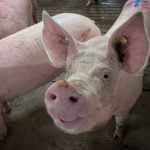
Tag Archives livestock health

Selenium: Agricultural, environmental and human concerns
Agronomy Management: From a water quality standpoint, health of rivers and lakes should be of highest priority

There are now many veterinary clinic models
Animal Health: Veterinarians have specialized and also offer more telemedicine

Lower stress, lower mycoplasma
Animal Health: The secondary respiratory and joint disease can be limited with prevention

Many management benefits from weighing cattle
The old adage that you can’t manage what you can’t measure applies in all stages of livestock production

‘Extra’ water key to reducing heat stress in calves
Dairy Corner: Keeping them hydrated is part of proper management when temperatures rise

Coccidiosis still a threat to be monitored
Animal Health with Roy Lewis: Important to control internal and external parasites

Spring is welcome, but it brings its own issues for calves
Pen Checker Diary: Nicer weather comes with a whole parcel of animal health risks

Risk of tetanus in cattle increasing
Animal Health: Your best approach is to prevent it through vaccination

Dealing with downer cattle, not simple or easy
Animal Health: There are many reasons a seemingly healthy cow can go down, and quite often no easy procedure to get her back up



